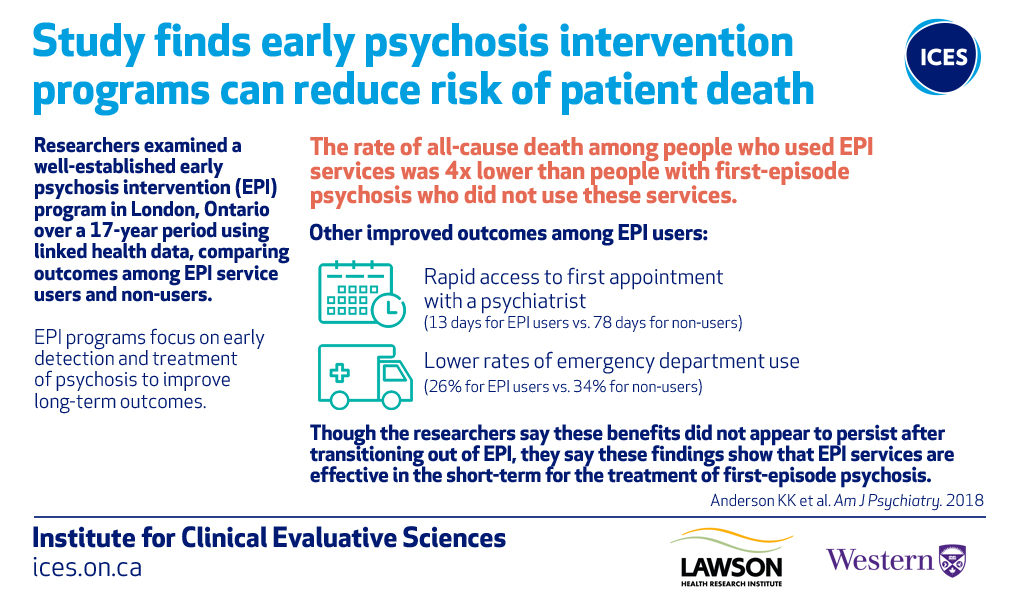

LONDON, ON – In a new study, researchers at Lawson Health Research Institute (Lawson), Western University and the Institute for Clinical Evaluative Sciences (ICES) have found that specialized programs for early psychosis can substantially reduce patient mortality.
Published online today in The American Journal of Psychiatry, the study examined health administrative data for patients treated between 1997 and 2013 at the Prevention and Early Intervention Program for Psychoses (PEPP) at London Health Sciences Centre. PEPP was founded in 1997 as the first early psychosis intervention (EPI) program in North America. EPI programs, which have been rolled out across Ontario, are specialized care models that focus on early detection of psychosis to provide intensive treatment during the first two or three years of illness.
“An episode of psychosis is characterized by delusions and hallucinations, as well as disorganized thought and behaviour patterns,” explains Dr. Kelly Anderson, lead researcher on the study, a scientist at Lawson and ICES, and an Assistant Professor at Western’s Schulich School of Medicine & Dentistry. “Evidence shows that early treatment of psychosis, from the first symptoms or episode, is very important in improving long-term outcomes.”
The study compared early psychosis patients at PEPP against those who were not treated through an EPI program. The research team studied patient outcomes within the first two years after diagnosis. They found that patients being treated at PEPP experienced a four-fold reduction in risk of mortality, compared with people with early psychosis receiving services elsewhere.
In addition, patients at PEPP had rapid access to their first appointment with a psychiatrist and their psychiatrist visit rates were 33.2 per cent higher than the non-EPI user group. They also experienced an 8.7 per cent reduction in emergency department visits and fewer involuntary hospitalizations.
“The aim of our study was to examine the ‘real-world’ effectiveness of EPI programs in the context of the Ontario health care system,” says Dr. Anderson. “Our results indicate a number of beneficial outcomes associated with EPI programs. Most importantly, the risk of mortality is significantly reduced.”
Previous research has shown that mortality is at least 24 times higher in the first year after diagnosis of a psychotic disorder when compared to the general population. Dangerous behaviours, medical co-morbidities and suicide are all potential factors.
The study also found that patients being treated at PEPP had lower rates of primary care visits and higher hospitalization rates overall. The researchers point to a need for more collaboration with primary care providers to reduce risks of co-morbidities associated with psychotic illness and anti-psychotic medications, such as weight gain and sedentary behavior. They also point to the need for additional research to understand higher hospitalization rates.
“Hospitalizations are often a necessary therapeutic intervention for patients with psychotic illness,” says co-author, Dr. Paul Kurdyak, a scientist at the Centre for Addiction and Mental Health (CAMH) and ICES. “While our study suggests that overall hospitalization rates are higher among EPI users, it also suggests involuntary hospitalization rates are lower. It may be that EPI users have better access to in-patient care and are more willing to seek care when needed.”
In addition, the research team examined patient outcomes from three to five years post-admission, when patients have typically transitioned from intensive EPI services to management by their psychiatrist. Many of the benefits associated with EPI programs were not observed after three years when compared to patients who did not receive EPI services, although EPI patients were still more likely to see a psychiatrist.
“We may be seeing fewer benefits long-term for a number of reasons,” adds Dr. Anderson. “While there is a reduction in intensity of EPI services at this time, there may also be improvements in individuals not treated through an EPI program due to the natural trajectory of psychotic illness. There are currently clinical trials being conducted worldwide to study whether the length of EPI programs should be extended.”
Dr. Anderson hopes to expand her research beyond London to confirm the findings across the province. “We’re fortunate that the Government of Ontario has invested heavily in the EPI model of care,” says Dr. Anderson. “Our findings show the ‘real-world’ benefits of EPI programs and also suggest clues on how we can make EPI programs even more effective in the future.”

-30-
Lawson Health Research Institute is one of Canada’s top hospital-based research institutes, tackling the most pressing challenges in health care. As the research institute of London Health Sciences Centre and St. Joseph’s Health Care London, our innovation happens where care is delivered. Lawson research teams are at the leading-edge of science with the goal of improving health and the delivery of care for patients. Working in partnership with Western University, our researchers are encouraged to pursue their curiosity, collaborate often and share their discoveries widely. Research conducted through Lawson makes a difference in the lives of patients, families and communities around the world. To learn more, visit www.lawsonresearch.ca.
Western delivers an academic experience second to none. Since 1878, The Western Experience has combined academic excellence with life-long opportunities for intellectual, social and cultural growth in order to better serve our communities. Our research excellence expands knowledge and drives discovery with real-world application. Western attracts individuals with a broad worldview, seeking to study, influence and lead in the international community.
The Institute for Clinical Evaluative Sciences (ICES) is an independent, non-profit organization that uses population-based health information to produce knowledge on a broad range of health care issues. Our unbiased evidence provides measures of health system performance, a clearer understanding of the shifting health care needs of Ontarians, and a stimulus for discussion of practical solutions to optimize scarce resources. ICES knowledge is highly regarded in Canada and abroad, and is widely used by government, hospitals, planners, and practitioners to make decisions about care delivery and to develop policy. For the latest ICES news, follow us on Twitter: @ICESOntario
Senior Media Relations Consultant
Communications & Public Engagement
T: 519-685-8500 ext. 73502
Celine.zadorsky@lhsc.on.ca